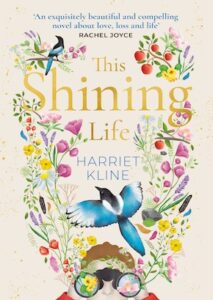Rich
by Harriet KlineHe woke up at dawn and shuffled to the edge of the bed. Ruth did not stir. She always slept deeply at this time, when there was a chill in the air and the sky was dusky over the river. Rich, though, was at his most wakeful. He rummaged in the heap of clothes on the floor, sniffing at the T-shirts to find a clean one. There was a brassy taste in his mouth like he was sucking a coin.
He wondered if his gifts had been delivered. He had an appointment at outpatients later that day, and he wanted to go round shaking people’s hands when he got there, making sure they’d each received a candle, that they understood how grateful he was. He’d wear his loudest Hawaiian shirt, he decided, the one with the pineapples on the sleeves, because the nurses liked to rib him about his clothes. They claimed to need sunglasses when they took his blood.
He fumbled into his shorts, his fingers numb and unresponsive with the buttons. Ruth lay still behind him, her lips slack against the pillow, a white smudge of spittle at the corner of her mouth. He hadn’t yet decided on a gift for her. Bolts of cloth, he thought, might leave her with a feeling of obligation, that she had to create something special, a memorial perhaps, when really all he wished was for her to delight in the colours. A scarf for her hair or a dress, seemed too plain. He wanted something magical and hopeful, secretive even, a message perhaps that only she could understand. All their conversations in the small hours, with the smell of the jasmine at the window, the warmth of their bodies on the sheets – he wished he’d recorded them, could present them to her now. Then she would know, he was certain, just how much her love had sustained him. His greatest fear for her was not that she would collapse or fail when he was gone, but that she would believe that she had. There was bound to be mess and misery ahead, and he wished there was something he could say now, so that she would not assume it was all her fault.
There was gold somewhere, he thought, and he was standing in the glow of it. The swallows dipped and curled in it, the leaf tips glinted with it and with each breath he pulled it deep into his being.”
He made his way onto the landing, steadying himself with his hand on the wall. Inspiration would come to him soon, he was sure of it, but for now he had to concentrate on hobbling down the stairs and out to the garden.
Since his diagnosis, it had become a ritual for him to rise at dawn and stand barefoot beneath the apple tree. He liked to listen to the birds and feel the cool, complex patterns of the grass beneath his feet. The sky was not yet blue at this time; above the house it was pale and peachy. There was gold somewhere, he thought, and he was standing in the glow of it. The swallows dipped and curled in it, the leaf tips glinted with it and with each breath he pulled it deep into his being.
This was the gift he’d like to give to Ruth. This precious glow and how it made him marvel at the world. The glow made him smile when Ollie scowled at him, it made him laugh when Angran jerked her head in disapproval. It made everything seem magical so that when he offered drinks or strawberries to his guests there always seemed to be enough in the house.
“It feels like there’s an angel watching over me,” he’d said once, attempting to explain this golden pleasure of being alive. Ruth had laughed, kissed the top his head.
“I’m your angel,” she said. “I ordered the strawberries with the online shop.”
How he loved Ruth’s laugh. Sometimes her face was dark, frowning with worry, but her laugh was a flare of warmth. She had the glow in her too, but all too often she resisted it. Everyone did. Ruth had turned it into a joke. Angran prickled at it. Nessa made it a quarry. She chased it at high speed, sleeves rolled up, hair flying out behind her, though it was there for the taking all along.
He turned his face once more towards the luminous sky. He wished they were all there with him, the people he loved. He wished his father was beside him blinking up at the robin on the chimney stack. He still didn’t know what to say to him about Ollie. Cut him some slack, Dad, he’s doing his best. You don’t need an apology, you need a laugh. It didn’t really matter. The chances were, Gerald wouldn’t understand, or would forget the conversation five minutes later. What mattered was that he should say something soon. On the roof, the robin lifted his beak and let fly a series of bubbling trills. Rich couldn’t wait to see Gerald and Ollie together again. He couldn’t care less if Ollie screeched, or Gerald wobbled his neck in disapproval. He no longer wished to deny them that experience, or withhold from them the chance to find their own way through.
 from This Shining Light (Doubleday, £14.99)
from This Shining Light (Doubleday, £14.99)
Harriet Kline works part-time registering births, deaths and marriages and writes for the rest of the week. Her story ‘Ghost’ won the Hissac Short Story Competition and ‘Chest of Drawers’ won The London Magazine Short Story Competition. Other short stories have been published online with Litro, For Books’ Sake and ShortStorySunday, and on BBC Radio 4. She lives in Bristol with her partner and two teenage sons. This Shining Life, her debut novel, is published by Doubleday/Transworld Digital in hardback, eBook and audio download.
Read more
harrietkline.com
@HareandHarriet
@DoubledayUK


